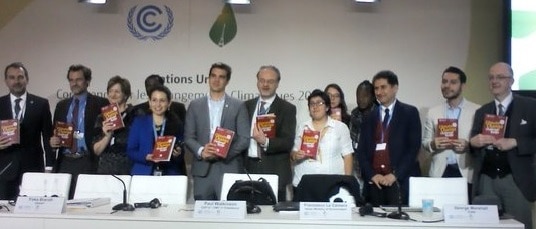As someone focused on unifying society to tackle climate change, thousands of people from across the world positively discussing how to deal with climate change is in many ways a dream come true. At the annual two week UN climate summit 20,000 delegates from all walks of life talk science, impacts, obstacles and solutions while negotiators attempt to hammer out the policies needed to address all these aspects.
From my perception this year’s event in Paris has been far more positive in three crucial ways:
- When previously the best that could be hoped for was an overall 2 degrees in rise temperature, 1.5 degrees is now being taken far more seriously.
- both China and the US have been progressive with the US even joining the high ambition panel, who have previously undermined negotiations
- The ambitious leadership taken by the French presidency effectively drove a more positive tone.
At the time of writing there are still a number of unresolved sticking points, including disagreement around funding, how any deal will be ratched up and fairness between developing and developed countries.
Whilst a positive agreement looks on the cards how this will be implemented is less clear. Without generating deep cross societal support for a low carbon economy it is hard to envisage governments going forward taking the significant steps needed at the speed necessary.

Our founder, George Marshall presenting at the UN Conference
Widening engagement has been the cinderella issue at the UN
One of the brightest lights I saw was the increasing emphasis the negotiations are putting on widening engagement and understanding amongst the public. For many years this has been the cinderella element of the UN’s activities but increasingly there is an understanding that without societal understanding of the issue it’s going to be a struggle to generate and maintain the political will to undertake the shifts needed to create a low carbon economy. This resulted in two days of the Paris summit being dedicated to education and widening engagement, days where we presented and our work was discussed.
But when great parts of the world have yet to hear of the issue and in other parts of the world the issue is accepted or rejected on political affiliations how do you achieve this? When few people can relate to scientific talk of 350ppm or the impacts likely in 2100 let alone understand the importance of a 2⁰ change in climate is it any wonder that most of society is disengaged from these world shaping negotiations? Is it any wonder that most people in the world don’t understand what the negotiations are even about.
Allowing people to understand the relevance of climate change to their lives and their values is crucial to wider engagement and our expertise in this area is starting to be sought by these international bodies. The UN invited us to present on our insights and bodies including UNESCO are keen to explore how our insights can help them roll out global engagement projects both in schools and beyond. Watch this space for updates!
Community Conversations
Whilst global institutions have an incredible potential to influence understanding an equally important area for us is helping communities talk to each other about climate change in a language that works for them.
In Paris our work was the centerpiece of Place 2 B, a key civil society space in the centre of the city where hundreds of climate advocates took part in activites for the two weeks themed around the seven dimensions of climate change report we produced with the RSA. This innovative approach to formatting an event saw us working with media broadcasters, faith groups, conservationists and activists to understand how to build the confidence to effectively break the climate silence.
Two weeks of being surrounded by people who care about climate change is nourishing for any of us who feel despair about climate action in our own communities what is vital is that we take those conversations out of the climate ghetto.
Throughout the negotiations it was agreed that any agreement would lay the bedrock for effectively tackling climate change, but wouldn’t be able to provide all the answers. The same is true for wider engagement, while the media and politicians are referencing climate change currently (particularly in light of the traumatic floods in the UK and in India) we need to continue and build on this momentum through conversations and action.
One response to Talking the talk and walking the walk in Paris?
Sign up to our newsletter
Thank you for signing up to our newsletter
You should receive a welcome email shortly.
If you do not receive it, please check your spam folder, and mark as 'Not Spam' so our future newsletters go straight to your inbox.

We very much appreciate your information and look forward to a final analysis of the conclusion of COP21.
We hope that you can continue to give us information that provide hope in our continued efforts to save the planet.
Locally we are trying to build a grass roots coalition to change us from being a climate denying community to a more enlightened one, and we will continue our efforts encouraged by the hopefully positive results of COP21.
Again, thank you for continuing to provide us with valuable information.
Raymond Spatti
Payson, Arizona
USA